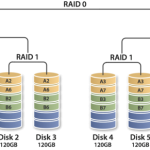
The notion of artificial intelligence (AI) has existed in one form or another since authors such as Arthur C. Clark first postulated about its existence in the 1960s. However, it was not until the latter half of the 1980s that AI became somewhat of a reality. At the time, this technology was devoted to truly massive computers with the ability to handle such complex programs. We have certainly come a long way in the past 30 years. Not only does artificial intelligence now play a role in our daily lives, but you might be surprised to learn that it is becoming increasingly important in laptop design. What advancements have allowed this movement to gain momentum and how might it affect our future online experiences?
All About Processing Power
One of the biggest hurdles which laptops have had to overcome involves the notion of processing power. Artificial intelligence requires a vast amount of memory in order to run its numerous processes. Sometimes known as “machine learning” within the industry, developers had to design entirely innovative ideas to essentially “pack” memory into devices of limited sizes. The good news is that smaller transistors and similar components now allow laptops to be equipped with gigabytes of on-board memory as standard options. It is likewise possible to upgrade to more robust RAM bundles in the event that more space is needed.
Of course, not all laptops are designed to work with advanced algorithms involving AI. This is why specialises brands will offer unique functions; ideal for programmers, gaming enthusiasts and software developers. Now that we have a basic understanding of why artificial intelligence has taken a hold, it is a good idea to take a look at what sectors can benefit from its presence.
Countless Applications to Choose From
The sheer number of AI-inspired innovations is difficult to count. In fact, the majority of consumers interact with this technology without even being aware of its existence. Some common examples worth mentioning include (but are by no means limited to):
- Predictive search engine text.
- CNC machining and 3D printing.
- Smart televisions.
- Chat bots designed to address customer service issues.
Artificial intelligence has also made its presence known within the gaming sector. Games are much more realistic than in the past. Enemies are unpredictable and their behaviours are often modelled off of the actions of the player. When these qualities are then combined with VR headsets and similar hardware, it is clear to understand why modern gaming enthusiasts are so excited about what the future might have in store.
Laptops have certainly come a long way since the first models were introduced to the public in the late 1980s and early 1990s. Still, we are really only scratching the surface of their technological potential. Will there ever come a day when a laptop will be able to double as a virtual “best friend”? Although the verdict is still out on this question, AI is definitely here to stay.






